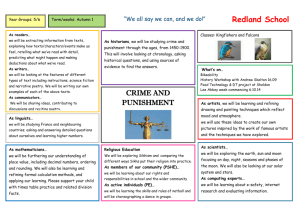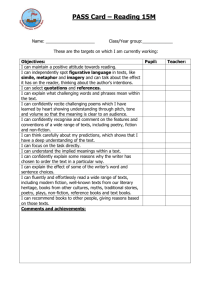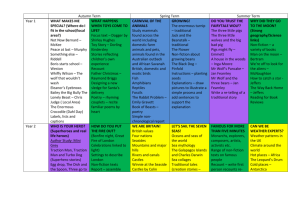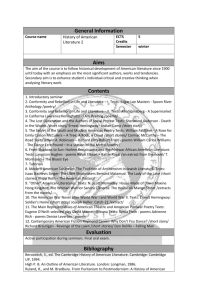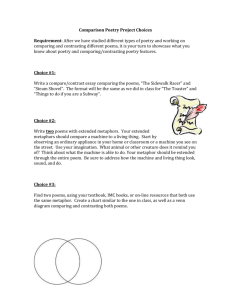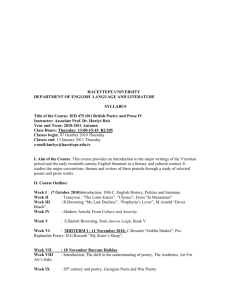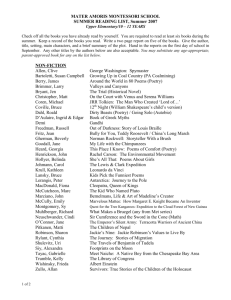Planning in Year 3: focus on poetry
advertisement
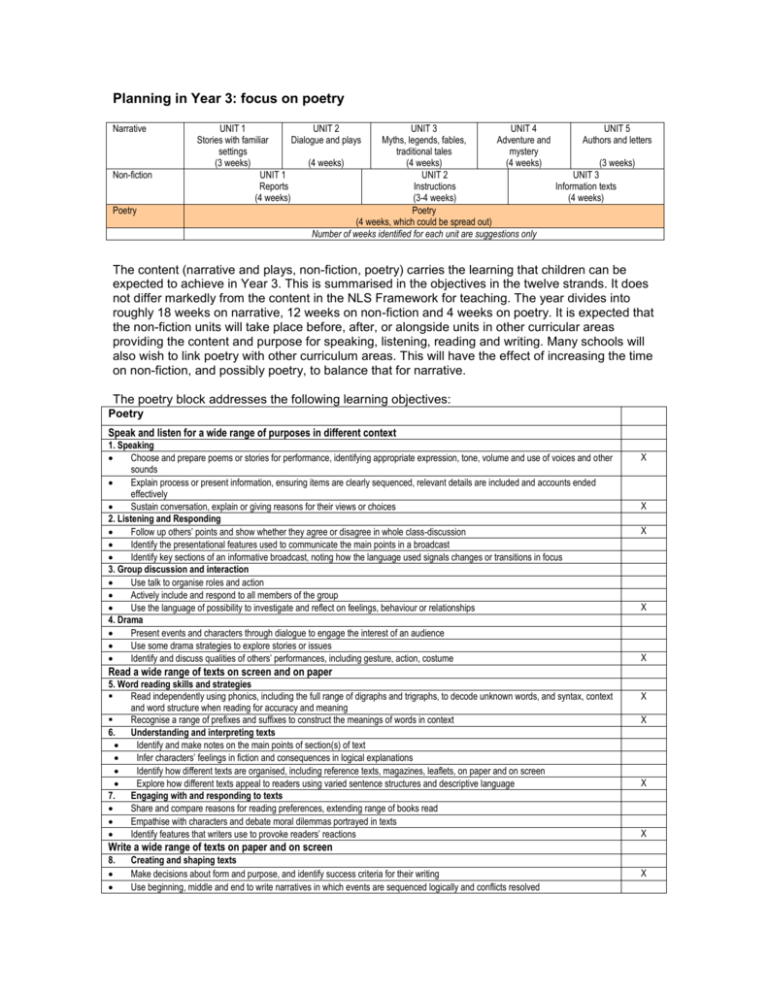
Planning in Year 3: focus on poetry Narrative Non-fiction Poetry UNIT 1 UNIT 2 Stories with familiar Dialogue and plays settings (3 weeks) (4 weeks) UNIT 1 Reports (4 weeks) UNIT 3 UNIT 4 UNIT 5 Myths, legends, fables, Adventure and Authors and letters traditional tales mystery (4 weeks) (4 weeks) (3 weeks) UNIT 2 UNIT 3 Instructions Information texts (3-4 weeks) (4 weeks) Poetry (4 weeks, which could be spread out) Number of weeks identified for each unit are suggestions only The content (narrative and plays, non-fiction, poetry) carries the learning that children can be expected to achieve in Year 3. This is summarised in the objectives in the twelve strands. It does not differ markedly from the content in the NLS Framework for teaching. The year divides into roughly 18 weeks on narrative, 12 weeks on non-fiction and 4 weeks on poetry. It is expected that the non-fiction units will take place before, after, or alongside units in other curricular areas providing the content and purpose for speaking, listening, reading and writing. Many schools will also wish to link poetry with other curriculum areas. This will have the effect of increasing the time on non-fiction, and possibly poetry, to balance that for narrative. The poetry block addresses the following learning objectives: Poetry Speak and listen for a wide range of purposes in different context 1. Speaking Choose and prepare poems or stories for performance, identifying appropriate expression, tone, volume and use of voices and other sounds Explain process or present information, ensuring items are clearly sequenced, relevant details are included and accounts ended effectively Sustain conversation, explain or giving reasons for their views or choices 2. Listening and Responding Follow up others’ points and show whether they agree or disagree in whole class-discussion Identify the presentational features used to communicate the main points in a broadcast Identify key sections of an informative broadcast, noting how the language used signals changes or transitions in focus 3. Group discussion and interaction Use talk to organise roles and action Actively include and respond to all members of the group Use the language of possibility to investigate and reflect on feelings, behaviour or relationships 4. Drama Present events and characters through dialogue to engage the interest of an audience Use some drama strategies to explore stories or issues Identify and discuss qualities of others’ performances, including gesture, action, costume X X X X X Read a wide range of texts on screen and on paper 5. Word reading skills and strategies Read independently using phonics, including the full range of digraphs and trigraphs, to decode unknown words, and syntax, context and word structure when reading for accuracy and meaning Recognise a range of prefixes and suffixes to construct the meanings of words in context 6. Understanding and interpreting texts Identify and make notes on the main points of section(s) of text Infer characters’ feelings in fiction and consequences in logical explanations Identify how different texts are organised, including reference texts, magazines, leaflets, on paper and on screen Explore how different texts appeal to readers using varied sentence structures and descriptive language 7. Engaging with and responding to texts Share and compare reasons for reading preferences, extending range of books read Empathise with characters and debate moral dilemmas portrayed in texts Identify features that writers use to provoke readers’ reactions X X X X Write a wide range of texts on paper and on screen 8. Creating and shaping texts Make decisions about form and purpose, and identify success criteria for their writing Use beginning, middle and end to write narratives in which events are sequenced logically and conflicts resolved X 9. 10. 11. 12. Write non-narrative texts using structures of different text types Select and use a range of technical and descriptive vocabulary Use layout, format, graphics, illustrations for different purposes Text structure and organisation Signal sequence, place and time to give coherence Group related material into paragraphs Sentence structure and punctuation Show relationships of time, reason and cause, through subordination and connectives Compose sentences using adjectives, verbs and nouns for precision, clarity and impact Clarify meaning through the use of exclamation marks and speech marks Word structure and spelling Spell unfamiliar words using known conventions and rules and a range of strategies including phonemic, morphemic and etymological Spell words containing short vowels, common prefixes and suffixes and inflected forms, doubling the final consonant where necessary Presentation Write neatly and legibly with handwriting generally joined, consistent in size and spacing Use keyboard skills to type, edit and redraft X X X X X X X X X Match between current planning and the NLS example of medium-term planning in 2003 and summary of unit Match with 2003 NLS example Summary Poetry units in terms 1, 2 and 3 Read a range of poems to include a selection on the same theme; oral and performance poetry and humorous poetry. This block can be subdivided into three parts which focus on: vocabulary using language to create effects performance These can be taught at any point during the year. Children listen, read aloud and recite poems. They discuss and respond to poems in a variety of ways including performance, music and art. Children explore the use of language, rhyme and other effects. They write different types of poem, experimenting with a wide vocabulary and using language to create different effects. 1998 Framework objectives covered: Read aloud and recite poems. Discuss choice of words to create impact and collect examples. Write shape poems. Explore, compare and categorise humour in poems. Recognise rhyme, alliteration, patterns of sound to create effects. Write using sound to create effects. Perform poems. Write new verses for performance. Evaluate performance.

